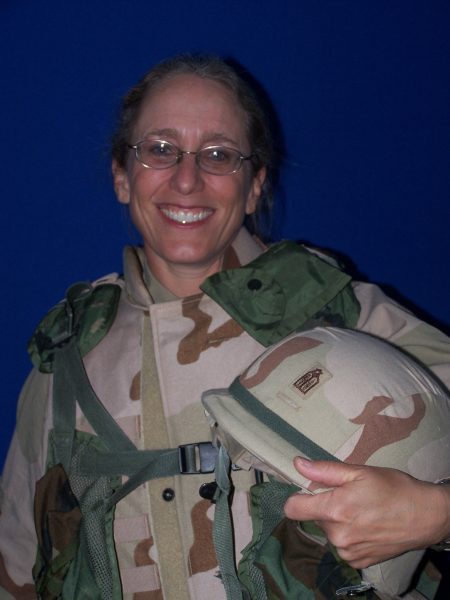by Rabbi Bonnie Koppell, CH (COL) USAR-Retired
Each year on Veterans Day, I pause to remember the privilege—and the weight—of raising my right hand and swearing to defend the Constitution of the United States. For me, that oath was not only about country but also about faith, freedom, and responsibility. No nation in Jewish history has offered greater freedom of religious expression than the United States, and I am profoundly grateful for that gift.
Despite the resurgence of antisemitism we face today, the First Amendment remains a promise. On this day, we honor those who choose to serve in uniform, protecting that promise for all. Fewer than one percent of Americans serve in the military. Serving those who defend our people and our freedoms is a sacred calling. What a unique and holy opportunity it was to support them as a chaplain.
A veteran, it has been said, is someone who once wrote a blank check payable to the United States of America for an amount up to, and including, their life. We humbly recognize that commitment and sacrifice.
 On May 22, 1978, I raised my right hand and took that oath to support and defend the Constitution. I had no idea of the extraordinary journey I was beginning—one that would take me from Korea to Germany, Iraq, Afghanistan, and Kuwait and eventually to the U.S. Army War College. Along the way, I carried two meaningful identities: rabbi and soldier.
On May 22, 1978, I raised my right hand and took that oath to support and defend the Constitution. I had no idea of the extraordinary journey I was beginning—one that would take me from Korea to Germany, Iraq, Afghanistan, and Kuwait and eventually to the U.S. Army War College. Along the way, I carried two meaningful identities: rabbi and soldier.
I was honored to serve for 38 years, and was the first female rabbi in the U.S. military. In uniform, I served as a chaplain in the U.S. Army Reserve. In my civilian life, I was a congregational rabbi. That dual role gave me the privilege of walking beside soldiers in their most vulnerable moments—celebrating holidays far from home, mourning losses, and offering strength in the face of uncertainty.
The path was not easy. At first, the Jewish Welfare Board (JWB) Commission on Jewish Chaplaincy, established during World War II to support Jewish soldiers, was unwilling to endorse a female rabbi as a chaplain. Without that endorsement, I could not serve. Finally, in 1985, the organization was dissolved and reconstituted as JWB Jewish Chaplains Council®, allowing Reform, Conservative, and Orthodox rabbis, including women, to serve. That act by JWB opened the door not only for me but for all who would follow—a reminder that institutions, too, can evolve toward justice and inclusion.
Chaplains care for all soldiers, regardless of faith. Yet it is those moments of deployment that stand out most vividly. I remember one Hanukkah at Bagram Airfield in Afghanistan, where we lit candles each night, and a sergeant attended faithfully. One evening he said quietly, “I didn’t realize how much I was longing to connect with my people.” Hanukkah—the only Jewish holiday that celebrates a military victory—felt especially meaningful to share with our soldiers.
The seder at Camp Taji in Iraq was another such moment. There, a young woman whispered afterward, “It almost feels like home.” In Iraq, a land emerging from its own bondage, opening the door for Elijah felt like a prayer for freedom and redemption—for them and for us. These were fragile, divine sparks—reminders that even in the most unlikely places, Jewish tradition could bring comfort, belonging, and strength.
As my career progressed, I was entrusted with greater responsibility, serving as Command Chaplain of the 63rd Regional Support Command, overseeing chaplains across seven states, and later the 807th Medical Command, with 11,000 soldiers. It was the most demanding intellectual challenge of my life—one that deepened my understanding of leadership, strategy, and the blessed responsibilities of command.
For more than a decade, I served as a member and ultimately chair of the CCAR delegation, which represents the Reform Movement on JWB Jewish Chaplains Council®. JWB’s mission is to safeguard the rights, meet the religious and spiritual needs, combat loneliness and isolation, and honor the service of Jews in the United States armed forces—ensuring that wherever Jews serve, they are never alone.
On this Veterans Day, I reflect on the words of Bernard Katz, a B-17 bomber co-pilot in World War II, who wrote: “I fight because it is an obligation, because free people must fight to remain free, because when the freedom of one nation or one person is taken away, the rights of all nations and all people are threatened.”
Bernard’s words remind us that service is both duty and privilege.
May America ever remain a beacon of freedom and justice for all. May we honor those who defend her, never forgetting the price of liberty. And may the day come soon when chaplains are no longer needed in war—because peace will reign among all God’s children.
Rabbi Bonnie Koppell, CH (COL) USAR-Retired, was the first female rabbi in the U.S. military and the first woman officially endorsed by JWB Jewish Chaplains Council® as a chaplain in this country’s armed forces. She served in the Army Reserve.